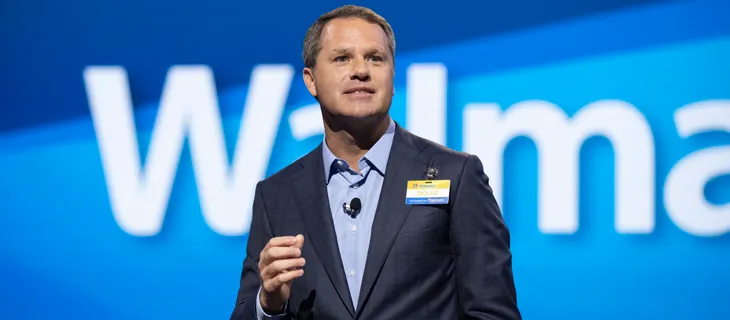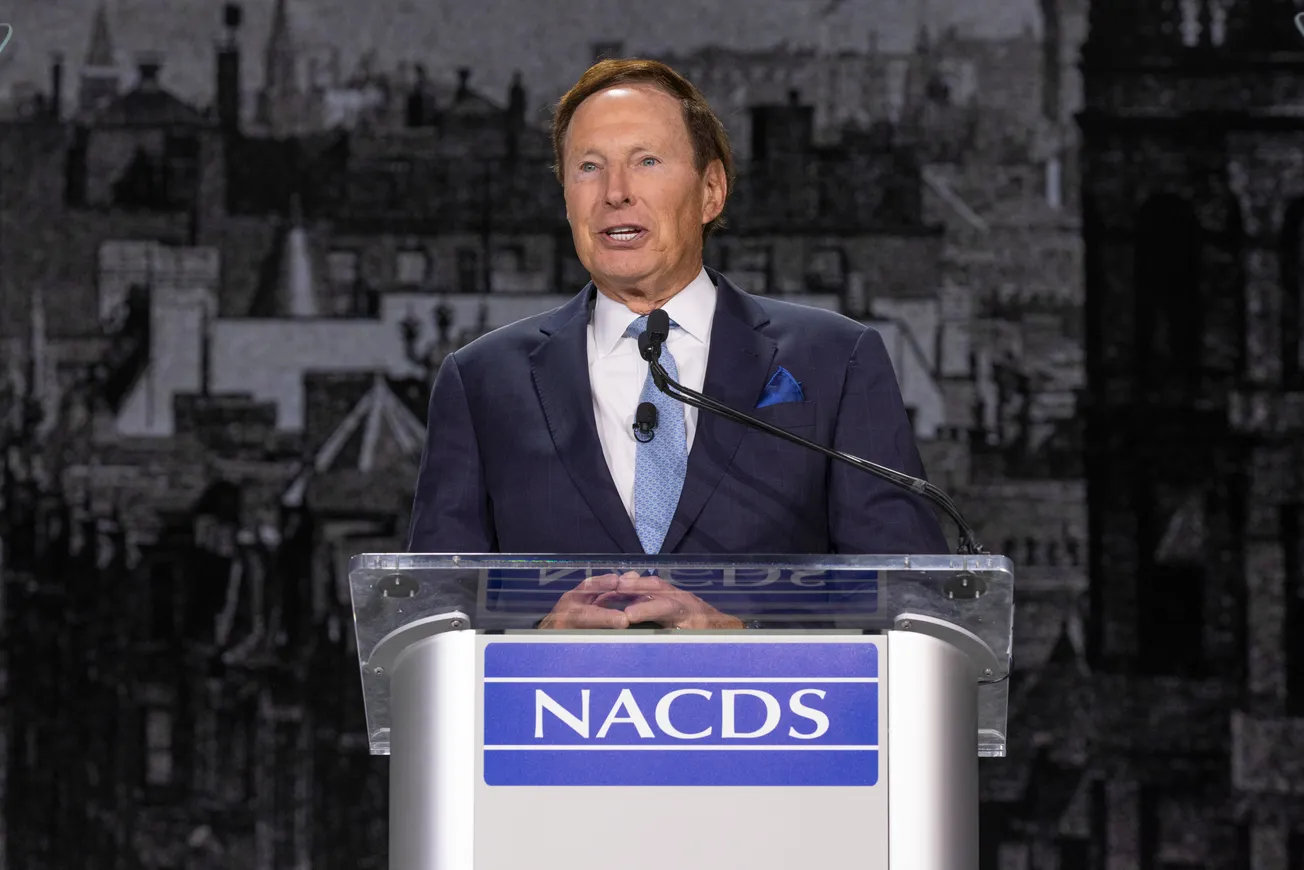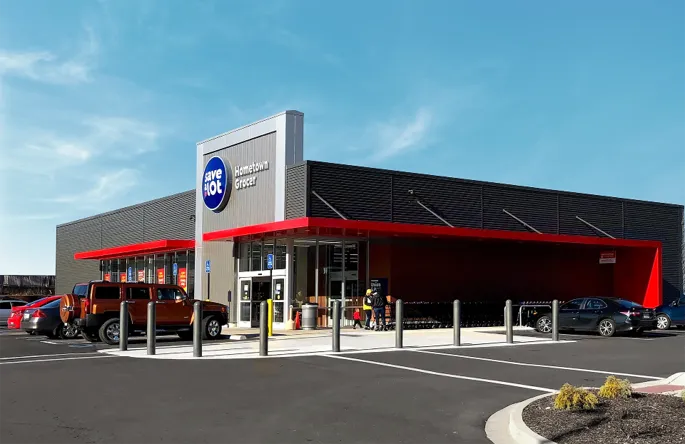BENTONVILLE, Ark. — The Walmart that Doug McMillon presides over is a different place than it was when he became CEO nine years ago. At the time, some industry observers viewed the company as too vast and deeply rooted in brick-and-mortar retailing to compete effectively in the age of e-commerce. With McMillon’s prodding, Walmart proved the critics wrong, pivoting to become a multifaceted enterprise.
“I’d like to call out how our people have changed and grown, McMillon said during last week’s Associates and Shareholders Celebration in Northwest Arkansas. “We were store experts, and we recruited e-commerce expertise and technology expertise in a variety of ways, including acquisition.
“If you fast-forward to today and hear how people think and what they know, including the people that are here and our broader group of merchants and operators, they’re omni now. There’s a digital language, there’s a different mindset as it relates to how we build technology. It is truly omni, and you’re seeing that payoff in the way we think about 1P, 3P, pickup, delivery; there’s a commitment to real-time problem solving.”
The needs of the consumer take precedence in determining Walmart’s ongoing evolution, he noted, which results in both higher satisfaction among customers and higher returns for the company. “Given our assets, you get a different and better outcome,” said McMillon. “It’s just so encouraging to me to know how much progress our leadership team has made. We don’t get any questions anymore about do you have or need e-commerce expertise because it’s now just become expertise across the board.”
Much, however, abides at Walmart, which last fiscal year for the first time surpassed $600 billion in revenue, and going forward aims to increase profits faster than sales. While recalling annual meetings over the course of the company’s 61-year history, chairman Greg Penner highlighted Walmart’s enduring mission: “I’ve flipped through some of these photos from those early meetings. I found one from 1981 that made me pause. That was a tough year for a lot of people. That poster in the background says, ‘We’re attacking inflation head-on with everyday low prices storewide. Inflation stops here.’
“This is the annual report from that year and in it, Sam [Walton] wrote, ‘The past year has presented many challenges to the retail industry and to your company. High interest rates, the economy in general has been depressed. However, we have confidence in our approach to discount retailing for the 1980s.’ It’s interesting because that sounds a lot like this past year. We’ve been here before and we’re well-prepared for the future. We’re confident in who we are, where we’re going, and we have a strategy to win.”
As Penner recalled, Walmart’s first few annual meetings were, at best, unremarkable. The initial one, held at a coffee shop in Bentonville, attracted six attendees; a year later no one showed up. That’s a far cry from the Associates Celebration in Fayetteville last Friday, which was attended by almost 20,000 people, including associates from all 20 countries where Walmart does business. The event was hosted by comedian Kevin Hart and included live musical performances by Shania Twain, John Legend, Snoop Dogg, Rachel Platten and Pitt Bull, as well as appearances by actors Tom Cruise (via video), Chris Evans and Chris Hemsworth.
It’s fitting that Walmart pulled out all the stops. Even with the heavy investment in new tools like store-based Market Fulfillment Centers, retail media, drone delivery, and technology to improve the member experience at Sam’s Club (which is at the top of its game as it marks its 40th anniversary), executives repeatedly stressed that the associates at Walmart’s 10,500 stores and other facilities around the globe remain the heart and soul of the organization.
“We’re a place of opportunity where associates’ voices are heard and associate feedback has been foundational to our company’s success,” McMillon noted. “We work to create a path of opportunity for everyone who wants a career at Walmart, more than just a job.”
Last week, the company made another in a series of investments in its workforce, increasing the pay of the 3,700 pharmacists and 4,000 opticians who staff its stores. The average yearly salary for the former group now exceeds $140,000; the latter’s wages are expected to rise to more than $22.50 an hour. In addition, the company is giving its staffers in its eye care department free access to training that will enable them to receive certification and licensure from the American Board of Opticianry and National Contact Lens Examiners.
“Our goal is to keep and develop people,” said McMillon. “We continue to support and invest in our associates through their wages, benefits, including health care, and ways to invest and save for retirement by making it easier to gain a college degree or certificate through our Live Better U program, where our company pays for tuition and books. We know that our long-term success will depend on how we create advancement and growth opportunities for our associates.”
In the current unsettled business environment, Walmart will need to harness all of the talent, energy and commitment of its workforce. Despite declining in recent months, the inflation rate is still close to 5% and fears of recession loom. At the same time, omnichannel competition among retailers has never been more intense, while divisive social issues present thorny new challenges for businesses.
McMillon and his colleagues expressed confidence that Walmart’s bedrock principle of helping people save money and live better is as relevant as ever. By building on its historic strengths and developing new means to deliver on that promise, the company has enhanced the prospects of remaining the retailer against which others are measured.
“Our founder once said something to the effect of, ‘There may be a recession coming. Let’s choose not to participate.’ Our mindset is something like that,” McMillon commented. “We want to offer a great value, and if families have more money, that’s great for us. If families are pressured, we want to be there for them. We’re trying to work hard right now, as we have been for quite some time, with our suppliers to get our prices down, whether that’s in food or in general merchandise.
“We think the company’s positioned to succeed, regardless of the environment. We can save people money. We can serve them through stores and clubs. We can serve them with pick up and delivery. We can save them time in ways that we couldn’t before. We’re offensive in nature.”










